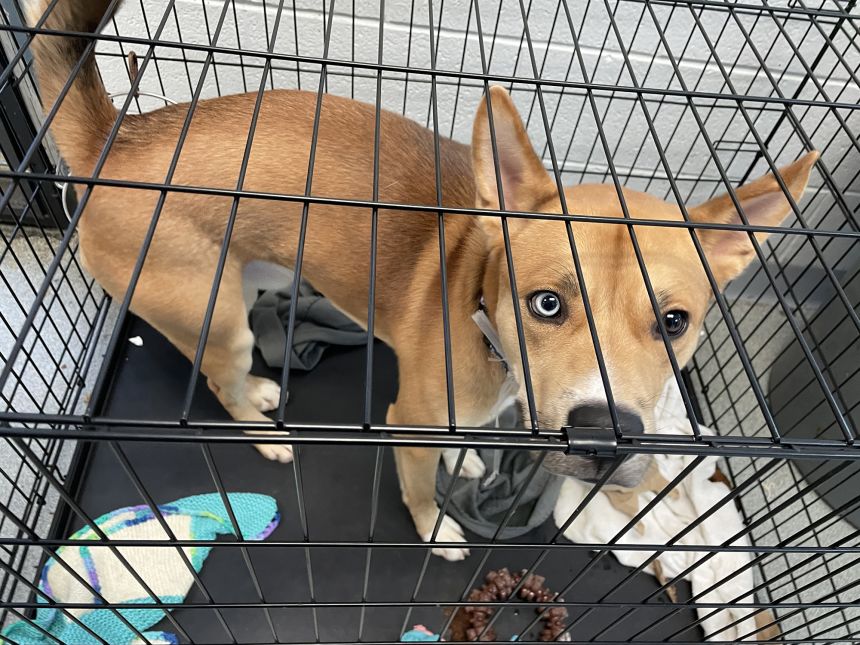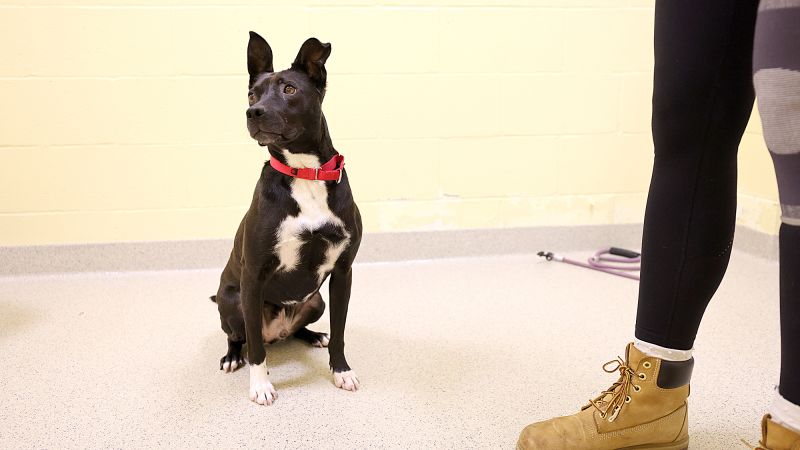In Melissa Knicely’s nearly 19 years at a North Carolina animal shelter, she’s learned to spot an unofficial and heart-wrenching sign that the economy may be taking a turn for the worse: When there’s a surge in the number of people looking to give up their pets.
That happened in the late 2000s, as the pain from the financial crisis spread; at other times when waves of layoffs hit the region; and, more recently, when inflation spiked.
And in recent months, that activity, which is referred to as “owner surrenders,” has picked up steam at Charlotte-Mecklenburg Animal Care & Control in North Carolina, where Knicely serves as the department spokesperson.
So far this year, owner surrenders are running nearly 43% higher than this time last year, she said.
“There are times when the economy has taken a dip or we’ve had a lot of job layoffs; and 100%, you’re going to see that significantly (in owner surrender cases),” she said. “We definitely see (an increase) anytime anything in the economy changes.”
The trend is not unique to the Charlotte-Mecklenburg region.
In recent months, animal rescues and shelters across the country are reporting sharp increases in animals being surrendered, with several of those organizations telling CNN that financial hardship was at the root of those owners’ decisions.
Every aspect of owning a pet, from vet visits and food to beds, treats and toys, has grown expensive in recent years — with some tariff-sensitive goods expected to become even pricier in the months to come. Compounding those rising expenses for pet owners can be a deterioration in financial stability, including unwieldy debt burdens, an unexpected (human or animal) medical event, or a job loss.
“It’s going to be financial for a few different reasons,” said Megan Larson, intake manager at Ruff Start Rescue, a foster-based organization in Princeton, Minnesota.
One very common theme is people can’t afford to stay where they live, she said.
“It just breaks us to see people cry that they have to give up their animal because they have to move somewhere that’s more affordable, and that place that’s more affordable for them doesn’t allow animals,” she said. “This is a very devastating decision that these people are forced to make. People don’t want to do this.”
Through July 24, Ruff Start has received 1,496 applications for owner surrenders and as many as 22 in a single day, according to data provided by Larson, who noted that the applications frequently are for multiple animals.
During the same period last year, there were 1,292 applications.
And while Ruff Start has a fairly sizable network of fosters (about 600 to 700 active in Minnesota), the organization doesn’t have the capacity for every animal in need.
“Talking to other rescues here locally, we’re all kind of panicking, because what we’re seeing is a lack of large dog fosters,” she said, noting that big dogs do eat more and have more expensive vet visits and often are the target of a property’s breed restrictions. “Which is why we do see a lot of people that have to surrender their large dogs.”
“We just need more fosters for those, and we could take some of these incredible dogs.”
Earlier this month, the Animal Care Centers of New York reached a “breaking point” and suspended intake due to “critical capacity issues.”
“This is not a decision we take lightly, but we cannot take any more owner surrenders,” the shelter announced July 18. “With over 1,000 pets in our care, we are at a breaking point.”
In Chicago, the city’s animal care and control office posted a notice on Instagram in May sounding the alarm:
“In just the first 20 days of May, we’ve averaged 56 animals coming into the shelter per day, a jump from April’s 54 per day. That may not sound huge, but at this volume, every increase stretches our already limited resources to the brink. 💔 Many of the pets in this line are arriving as strays. But many are also being surrendered by their owners… people who likely love their pets, but may not know what else to do,” the post said.
Animal shelters across the United States increasingly hitting capacity is a reflection of the “perfect storm” that’s been brewing in recent years, said Cesar Perea, associate vice president of rescue for the American Humane Society.
As part of the constellation of a rising cost of living and financial constraints, an ongoing shortage of veterinarians has driven care costs higher, he said.
Additionally, in the years following the pandemic-spurred pet ownership boom, rental properties grew stricter on allowing animals, and there was a noticeable uptick in behavioral issues because of a lack of socialization for pandemic puppies raised during a lockdown, he added.

“The economic hardships, that’s a big contributor to the increase in shelters being full,” Perea told CNN. “But I think there’s really a perfect storm of things that are occurring.”
And in Los Angeles County, California, there’s a new headwind: Since early June, there have been more than two dozen animals relinquished because their owner was deported, said Christopher Valles, animal control manager at the County of Los Angeles’ Department of Animal Care and Control.
“We do try to provide resources for anybody who’s in that difficult position,” Valles said.
The DACC encourages any pet owner, including those potentially impacted by immigration-related matters, to reach out to the agency for assistance.
“We do try to provide resources for anybody who’s in a difficult position,” he said. “We can provide (the pets) food, medical treatment and support … just so we can have retention in the home.”
How to help and get help
Local shelters, rescue organizations and veterinarians can serve as first points of contact and may offer resources such as food, reduced or free medical care, pet supplies, training services and temporary fostering.
Local impounds and animal control agencies also can serve as resources. “Sadly, a lot of people still think of them as the ‘dog catchers’ and assume every animal there will be euthanized,” said Megan Larson, of Minnesota’s Ruff Start Rescue. “Every single impound and animal control team we work with wants to see their animals in rescues like ours and eventually in homes.”
Try to reach out to organizations before it becomes an emergency. There’s no shame in asking for help.
Never abandon your animal. In addition to contacting local organizations (including no-kill shelters and breed-specific rescues), consider reaching out to friends, family or a trusted acquaintance who might be able to provide a loving home — but screen carefully.
If you’d like to help, consider becoming a foster, volunteer time at your local rescue or shelter, or donate funds to vetted and licensed organizations.



